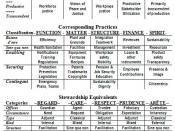1.0 INTRODUCTIONSocial responsibility is an ethical or ideological theory that an entity whether it is a government, corporation, organization or individual has a responsibility to society. This responsibility can be "negative", meaning there is a responsibility to refrain from acting (resistance stance) or it can be "positive," meaning there is a responsibility to act (proactive stance).
There is a large inequality in the means and roles of different entities to fulfill their claimed responsibility. This would imply the different entities have different responsibilities, in so much as states should ensure the civil rights of their citizens, that corporations should respect and encourage the human rights of their employees and that citizens should abide with written laws. But social responsibility can mean more than these examples. Many Non-governmental organizations (NGOs) accept that their role and the responsibility of their members as citizens are to help improve society by taking a proactive stance in their societal roles.
It can also imply that corporations have an implicit obligation to give back to society (such as is claimed as part of corporate social responsibility and/or stakeholder theory).
A third way that business can use ethical decision making to secure their businesses is by making decisions that allow for government agencies to minimize their involvement with the corporation. (Kaliski, 2001) For instance if a company is proactive and follows the United States Environmental Protection Agencyâ guidelines for admissions on dangerous pollutants and even goes an extra step to get involved in the community and address those concerns that the public might have; they would be less likely to have the EPA investigate them for environmental concerns. "A significant element of current thinking about privacy, however, stresses "self-regulation" rather than market or government mechanisms for protecting personal information" (Pride et al., 2008). Most rules and...


